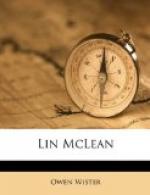The sheriff in the cab took off his hat to Miss Buckner, remarking that she should belong to the force; and as the bell rang and the engine moved, off popped young Billy Lusk from his cow-catcher. With an exclamation of horror she sprang down, and Mr. McLean appeared, and, with all a parent’s fright and rage, held the boy by the arm grotesquely as the sheriff steamed by.
“I ain’t a-going to chase it,” said young Billy, struggling.
“I’ve a mind to cowhide you,” said Lin.
But Miss Buckner interposed. “Oh, well,” said she, “next time; if he does it next time. It’s so late to-night! You’ll not frighten us that way again if he lets you off?” she asked Billy.
“No,” said Billy, looking at her with interest. “Father ’d have cowhided me anyway, I guess,” he added, meditatively.
“Do you call him father?”
“Ah, father’s at Laramie,” said Billy, with disgust. “He’d not stop for your asking. Lin don’t bother me much.”
“You quit talking and step up there!” ordered his guardian. “Well, m’m, I guess yu’ can sleep good now in there.”
“If it was only an ‘L. and N.’ I’d not have a thing against it! Good-night, Mr. McLean; good-night, young Mr.—”
“I’m Billy Lusk. I can ride Chalkeye’s pinto that bucked Honey Wiggin.”
“I am sure you can ride finely, Mr. Lusk. Maybe you and I can take a ride together. Pleasant dreams!”
She nodded and smiled to him, and slid her door to; and Billy considered it, remarking: “I like her. What makes her live in a car?”
But he was drowsing while I told him; and I lifted him up to Lin, who took him in his own blankets, where he fell immediately asleep. One distant whistle showed how far the late engine had gone from us. We left our car open, and I lay enjoying the cool air. Thus was I drifting off, when I grew aware of a figure in the door. It was Lin, standing in his stockings and not much else, with his pistol. He listened, and then leaped down, light as a cat. I heard some repressed talking, and lay in expectancy; but back he came, noiseless in his stockings, and as he slid into bed I asked what the matter was. He had found the Texas boy, Manassas Donohoe, by the girl’s car, with no worse intention than keeping a watch on it. “So I gave him to understand,” said Lin, “that I had no objection to him amusing himself playing picket-line, but that I guessed I was enough guard, and he would find sleep healthier for his system.” After this I went to sleep wholly; but, waking once in the night, thought I heard some one outside, and learned in the morning from Lin that the boy had not gone until the time came for him to join his outfit at the corrals. And I was surprised that Lin, the usually good-hearted, should find nothing but mirth in the idea of this unknown, unthanked young sentinel. “Sleeping’s a heap better for them kind till they get their growth,” was his single observation.




